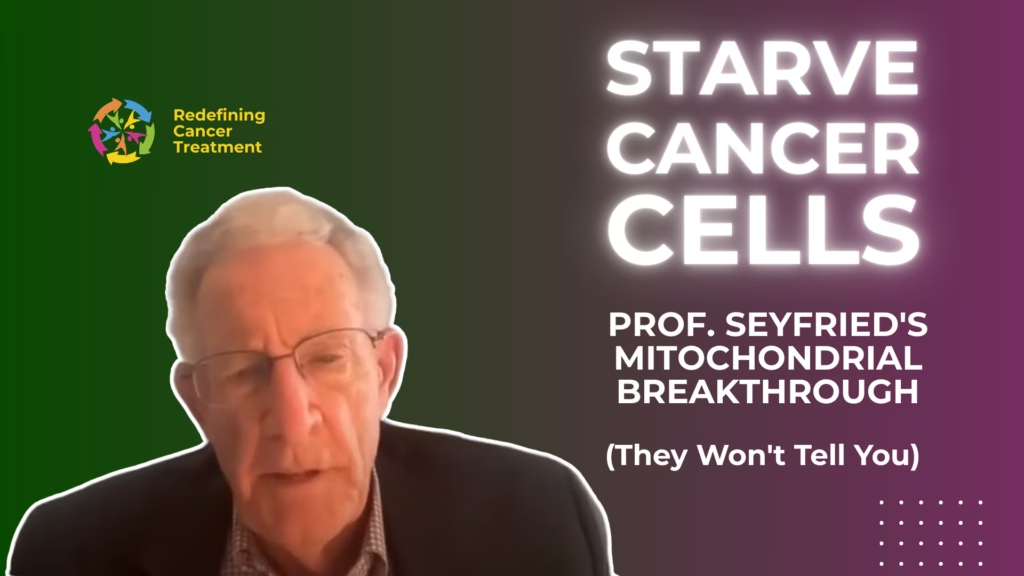
Thomas Seyfried Warns Against Unauthorised Use of His Work in Cancer-Keto Promotions
Dr. Thomas Seyfried Issues Warning: “Stick to My Published Work”⚠️ The cancer researcher clarifies he has no ties to “keto for cancer”
In a recent video, Prof. Thomas Seyfried discusses a ground-breaking approach to cancer treatment, focusing on the metabolic aspects of the disease. He emphasises that cancer is primarily a mitochondrial metabolic disease rather than a genetic one. Here are some key insights from his discussion:
Professor Seyfried
Quotes
“Cancer cells have a defective energy production through oxygen, causing them to switch to fermentation energy, an ancient form of energy without oxygen.”
“You cannot lower glutamine with diet; you need drugs to target glutamine.”
Prof. Seyfried’s work highlights the importance of understanding cancer as a metabolic disorder and proposes a therapeutic strategy that involves dietary changes and drug interventions to manage cancer effectively.
Prof. Seyfried explains that cancer cells rely heavily on two fuels: glucose and glutamine. Unlike normal cells, which can use various energy sources, cancer cells are restricted to these two fuels due to their defective mitochondrial function. This defect leads them to use fermentation, an inefficient form of energy production that does not require oxygen. This metabolic shift is a hallmark of cancer cells and is crucial for their survival and growth.
The therapeutic approach Prof. Seyfried outlines involves a two-pronged strategy:
Prof. Seyfried stresses the importance of maintaining healthy mitochondria to prevent cancer. Mitochondria are the powerhouses of cells, responsible for producing most of the cell’s energy through oxidative phosphorylation. When mitochondria are damaged, cells may resort to fermentation, leading to uncontrolled growth—a hallmark of cancer. Factors such as obesity, lack of exercise, poor sleep, and chronic stress can damage mitochondria, increasing the risk of cancer.
Understanding cancer through the lens of evolutionary biology reveals that cancer cells utilise ancient pathways that existed before oxygen was present in the atmosphere. These pathways allowed early life forms to grow rapidly in an oxygen-free environment. Similarly, cancer cells exploit these pathways for rapid growth, disregarding normal cellular regulation.
Prof. Seyfried’s approach offers a promising strategy for managing cancer with minimal toxicity by targeting the metabolic vulnerabilities of cancer cells. By focusing on dietary changes and drug interventions, it is possible to weaken cancer cells while strengthening normal cells. Additionally, maintaining healthy mitochondria through lifestyle choices can significantly reduce the risk of developing cancer.
Prof. Seyfried’s insights into cancer as a metabolic disease offer a compelling perspective on both treatment and prevention. By understanding the metabolic dependencies of cancer cells and addressing them through a combination of diet and targeted drug therapy, there is potential for more effective cancer management with reduced side effects. Moreover, emphasising the role of mitochondrial health in preventing cancer underscores the importance of lifestyle choices in maintaining overall well-being. As Prof. Seyfried notes, keeping mitochondria healthy makes it very difficult for cancer to develop, highlighting a proactive approach to cancer prevention.

Dr. Thomas Seyfried Issues Warning: “Stick to My Published Work”⚠️ The cancer researcher clarifies he has no ties to “keto for cancer”

Professor Thomas Seyfried’s groundbreaking metabolic therapy framework reveals how targeting cancer’s energy vulnerabilities—through ketogenic diets and repurposed drugs like Fenbendazole—offers

In this paradigm-shifting analysis of cancer biology, Professor Thomas Seyfried (Boston College) talks about starving cancer cells and dismantles the

The video explores how metabolic therapy can revolutionise cancer treatment by targeting cancer cells’ reliance on glucose and glutamine for energy. It